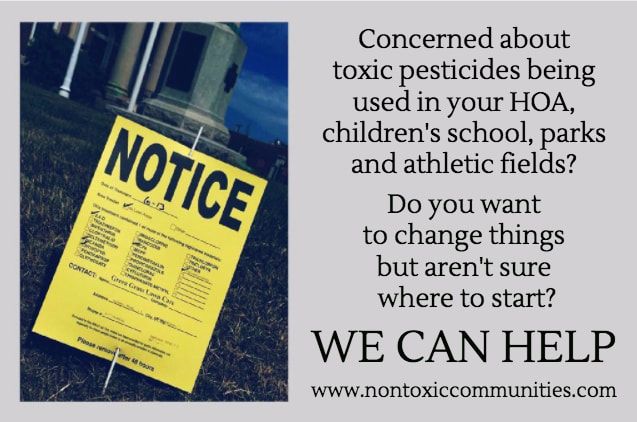|
Read our press release
National advocacy group Non Toxic Communities has launched their upgraded website with free resources for citizens concerned about pesticide use in their cities, schools, parks, and HOAs. Founded by two women who have been successful in helping their own cities to switch to organic policies and management practices on public property, Non Toxic Communities has been supporting others to do the same since 2016. The website has sample documents, printed materials, links to scientific research, and much more to share with officials in any community. These resources are designed to take the guesswork out of advocating for landscaping practices that do not rely on toxic pesticides. Information on the benefits of organic land management, the risks of using conventional pesticides, and many real life examples of successful organic programs can assist individuals in their own campaign. The updated site makes it easy to search for a non toxic group by state, and provides the tools needed to form your own group. Diana Carpinone, Co-Executive Director of Non Toxic Communities and founder of Non Toxic Dover NH observed that, “Our new website is coming at a time when an unprecedented amount of people are becoming aware of the negative effects that toxic pesticides have on our health and on our environment.” Toxic pesticides have been in the news over the last couple of years, with much attention being given recently to the world’s most used herbicide ingredient, glyphosate, due to the number of class action lawsuits being litigated in the courts. The very first trial ended with the jurors awarding tens of millions of dollars to a school grounds keeper with non-Hodgkin's lymphoma who used the chemical to kill weeds on the job. "Switching to an organic policy on public grounds not only benefits the residents who use that property, but it protects the health of workers who are exposed to these chemicals when they are handling large quantities of them on a regular basis,” says Kathleen Hallal, Co-Executive Director of Non Toxic Communities. As a board member of Irvine’s PTA, Hallal was successful in convincing her school district to stop using toxic products. Other parents came forward, and as a result Non Toxic Irvine formed and convinced the city to follow suit in 2016. From the beginning, it was always her intention to help people in other towns do the same and shortly thereafter joined together with Carpinone to provide support nationally as Non Toxic Communities. The new website is designed to help people who have no previous experience with pesticides, or grassroots advocacy. "When I started out in 2013 in my city, I had never done anything like this before. But when I saw a sign announcing a recent pesticide application on our library's lawn where my son had played countless times - I knew I had to do something about it,” says Carpinone. "I knew that if I didn't, children just like my son would continue to be exposed to these chemicals, and probably even without their parents knowledge. I just happened to be there during the 24 hour period that the sign is required to be posted. Before that I had no idea what was happening.” Her city, Dover, New Hampshire, voted unanimously for a commitment to organic land management practices resolution in February 2018. They are currently working with the nonprofit group Beyond Pesticides to implement their policy throughout the city. Dover has also received a grant from the New Hampshire based Stonyfield Farm, Inc. as a part of their StonyFields initiative to convert an athletic field to organic. From coast to coast, just like in Irvine and Dover, dozens of groups exist all across the country who are fighting for similar organic policies of their own. Nearly twenty states now have non toxic groups. About 80 cities have policies for public spaces, plus dozens more with pesticide free parks, ordinances covering both public and private property, and other pesticide restrictions. People concerned about pesticides being used at their HOA, children’s school, athletic fields or public recreational areas are not alone. It’s now easier than ever for people to find the tools to advocate for organic policies where they live. To find a group near you, or learn how to put together your own group and find support and free resources, visit nontoxiccommunities.com. Comments are closed.
|
Archives
March 2024
Categories |
|
Non Toxic Communities is a 501 (c) (3) charitable organization
Nontoxic Communities Foundation, Inc. dba Non Toxic Communities Copyright © 2024 Non Toxic Communities - All Rights Reserved Site design by Bee Rooted | About Us | Contact Us |

 RSS Feed
RSS Feed
